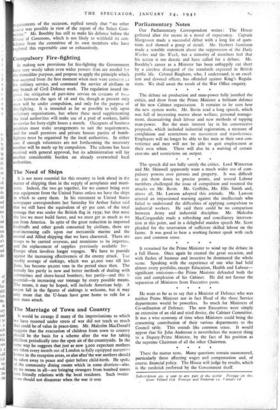The Need of Ships
It is not more essential for this country to look ahead in the matter of shipping than in the supply of aeroplanes and muni- tions. Indeed, the two go together, for we cannot bring over war equipment from the United States unless we have the ships in which to carry them. In his statement to United States newspaper correspondents last Saturday Sir Arthur Salter said that we still have the equivalent of 97 per cent. of the total tonnage that was under the British flag in 1939; but that none the less we must build faster, and we must get as much as we can from America. In spite of the great reduction in imported foodstuffs and other goods consumed by civilians, there are ever-increasing calls upon our mercantile marine and the neutral and Allied shipping that we have chartered. There are troops to be carried overseas, and munitions to be importec, and the replacement of supplies previously available fre- Europe often involves longer voyages. We have to provide against the increasing effectiveness of the enemy attack. Tne weekly average of sinkings, which was 41,000 tons till last June, has become 90,000 tons in the period since then. The remedy lies partly in new and better methods of dealing with submarines and shore-based bombers, but partly—and this is essential—in increasing our tonnage by every possible means. The means, it may be hoped, will include American help. A recent fall in the figures of sinkings is welcome, but it may only mean that the U-boats have gone home to refit for a new mass attack.






























 Previous page
Previous page